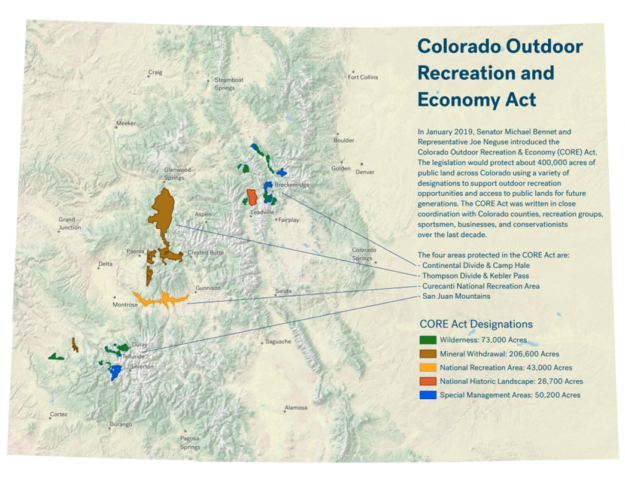Widgetized Section
Go to Admin » Appearance » Widgets » and move Gabfire Widget: Social into that MastheadOverlay zone
CORE Act gets a Senate hearing but Bennet kept from testifying as Trump officials cast doubt

The Colorado Outdoor Recreation and Economy (CORE) Act that’s twice passed the U.S. House of Representatives finally got a Senate hearing on Wednesday, but the legislation that’s been 10 years in the making and includes public lands in Eagle County still faces an uphill battle to become law in the current lameduck session.
Senate sponsor Michael Bennet of Colorado, who’s not on the Senate committee that considered the bill, requested the opportunity to testify on Wednesday but was denied that chance.
Trump administration officials reportedly blasted the bill during the hearing. Here’s a press release from proponents of the legislation, including Eagle County Commissioner Kathy Chandler-Henry:
The Senate Committee on Energy and Natural Resources (SENR) Subcommittee on Public Lands, Forests, and Mining held a hearing Wednesday on the Colorado Outdoor Recreation and Economy (CORE) Act (S. 241). The legislation was introduced by Sen. Michael Bennet and Rep. Joe Neguse in January 2019 and was passed by the House with bipartisan support both last fall and as part of the National Defense Authorization Act (NDAA) earlier this year.
The CORE Act coalition is heartened that the legislation was included in the SENR hearing, and given the few legislative days left in this Congress, the NDAA offers an opportunity to advance the bill. The last major public lands bill for Colorado was passed in the 2015 NDAA to protect the Hermosa Creek wilderness and watershed, and advocates urge this Congress to do the same to leave a greater natural legacy for future generations.
“Eagle County is pleased that the CORE Act is moving through the Senate,” said Eagle County Commissioner, Kathy Chandler-Henry. “Our public lands define the American spirit and continue to be a place where people go to gain strength and resiliency. Our reliance on public lands is especially apparent in this time of challenges from COVID-19. The CORE Act will designate Camp Hale as National Historic Landscape and preserve important wildlife habitat prized by local hunters and anglers. I want to thank Senator Michael Bennet and Representatives Joe Neguse and Diana DeGette for their leadership. We are hopeful that the CORE Act passes the U.S. Senate so current and future generations can always have a place to go for reflection, growth, and adventure.”
The bill safeguards some of Colorado’s most iconic, historic, and ecologically significant public lands while bolstering the region’s world-renown outdoor recreation opportunities, supporting local economies, and honoring our country’s veterans. The CORE Act is a product of a decade of collaboration and compromise between businesses, recreationists, sportsmen, and conservation groups, and would protect 400,000 acres of public lands including 73,000 acres of new wilderness and roughly 80,000 acres of recreation and conservation management areas. This includes places like McKenna Peak, the Continental Divide, and the San Juan Mountains. Camp Hale, where World War II 10th Mountain Division soldiers trained, would also be protected as the nation’s first National Historic Landscape.
Bradley Noone, a 10th Mountain Division Veteran, added, “Our public lands, including Camp Hale and the surrounding areas, define our country, and it is what I fought to defend. Moving the CORE Act forward in the Senate and adding it to the National Defense Authorization Act is fitting for it will honor generations of veterans, from World War II to Operation Enduring Freedom. World War II veterans were part of the greatest generation, and I hope we can honor our remaining brothers and sisters by making the CORE Act the law of the land.”
It is clear how important Colorado’s public lands and waters are to residents, as during the COVID-19 pandemic, more and more people have turned to nature for their physical, emotional, and mental health. Coloradans have always known that outdoor recreation and rural communities are the backbone of the state’s economy, and the pandemic has made that even clearer. The outdoor recreation industry is an economic juggernaut in Colorado, contributing $62 billion and is responsible for a half million jobs according to Colorado Parks and Wildlife.
“Long-term protection for areas in the San Juan Mountains included in CORE Act has been strongly supported by our communities for over a decade now because we rely on these places for our own recreational opportunities, and they drive our local economy,” said Erik Dalton, owner of Montrose Surf and Kayak and Jagged Edge Mountain Gear. “People come here from all over the world to experience the beauty and wildness of our public lands. The adventures they have here shape their lives and they keep coming back, again and again. We value the incredible landscapes and ecosystems included in the CORE Act, and we ask our elected officials to think about our future and pass the CORE Act.”
The bill would preserve healthy wildlife habitat by protecting key areas from road building, new mines and oil and gas drilling, and other activities that would degrade wildlife habitat and watershed values. It would also safeguard backcountry hunting opportunities and important big game habitat on our public lands across the state, in addition to protecting habitat for black bear, bighorn sheep, mountain goat, sage grouse, moose, lynx, wild turkey, and the rare wolverine. And it would preserve the land bridge and critical wildlife migration corridor over Interstate 70 at the Eisenhower Tunnel.
“Ensuring Colorado’s backcountry is conserved for time-tested traditions like hunting and fishing is essential to local economies and the Western way of life. It is clear now more than ever that our livelihoods are directly linked to protecting public lands. We collectively need to preserve these resources through sustainable efforts. I am grateful to the Senate Energy and Natural Resources Committee for considering the CORE Act, and I hope that Congress passes it,” said Heather Patterson, owner of RIGS Fly Shop & Guide Service in Ridgway.


